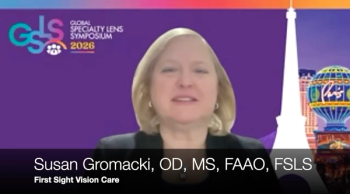
Be present with your patients
Make a more deliberate effort to be present with your patients
The views expressed here belong to the author. They do not necessarily represent the views of Optometry Times or UBM Medica.
Good friend and colleague Dr. Mike Brown recently forwarded an essay,
Dr. Verghese is a very unique and accomplished individual. In addition to being professor and vice-chair in the Department of Internal Medicine at Stanford University, he has an MFA from the Iowa Writers Workshop and is a best-selling novelist.
This essay, like many of his works, focuses on healing in a time when technology often overwhelms the human side of medical care.
Previously from Dr. Bowling:
The theme of this piece is in the era of electronic medical records, where we fill in all the little electronic boxes: we have lost contact with our patients. “The result is a mess,” he states,” with great unhappiness in the ranks.”
Don’t get him wrong: The representation of the patient in the electronic medical record (the iPatient, as he terms it) is a necessary evil. However, spending too much time with the iPatient is a guaranteed way of not being present with the actual patient.
His words struck a chord.
Long ago in a simpler, easier time, I would examine the patient, discuss my findings, complete only the paperwork necessary to get the patient to the next step along the process, then complete the paper chart in my sloppy handwriting whenever I found a spare moment during the day. I wanted to take the time I’d spend with my patient actually with my patient instead of filling out forms while the patient sat quietly and uncomfortably in the exam chair. This way I could actually concentrate on my patient and this needs.
Over time, with the adaptation of EMR, I find myself talking to the iPad screen instead of talking to my patient. This is ironic because I chose an iPad system thinking I could more easily interact with my patients and not stare at a computer screen.
I find that I am finishing the electronic record during the visit and worry way too much about filling in the electronic boxes. Make sure I have a chief complaint. Make sure I have all the meaningful use criteria documented.
I wonder if I am losing contact with my patients. After all, taking time to catch up with the goings-on in my patients’ lives is a really joyful part of what I do.
“There are a few things that are timeless in medicine, unchanged since antiquity,” Dr. Verghese writes. “One is the simple truth that patients want us to be more present. We as physicians want to be more present with the patient as well, because without that contact, our professional life loses much of its meaning.”
I agree with him, and I am going to make a more deliberate effort to be present with my patients. Presence. It is, as he says, “a one-word rallying cry for patients and physicians, the common ground we share, and the one thing we should not compromise.”
Reference
1. Verghese A. The Importance of Being. Health Affairs. 2016;35(10):1924-1927.
Newsletter
Want more insights like this? Subscribe to Optometry Times and get clinical pearls and practice tips delivered straight to your inbox.















































